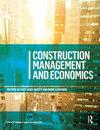触发事件对创新行为的影响:来自2019冠状病毒病期间从建筑专业人员收集的数据的见解
IF 3.3
Q2 BUSINESS
引用次数: 0
摘要
在2019冠状病毒病大流行期间,建筑业和其他行业报告了一些创新实例,这与之前指出的危机和环境动荡期间创新活动的高峰一致。然而,导致环境扰动下行为体创新行为变化的行为机制和因素尚未得到充分理解。本文以可激创新行为模型(EIBM)为基础,研究了这种行为机制和因素,EIBM从行为主体的稳定状态需求和激发状态需求两方面解释了行为主体创新行为的自愿或强制变化。调查结果基于在COVID情况下通过在线调查(N = 266)和访谈(N = 14)收集的数据。结果表明,环境扰动既能引发创新活动的增加,也能引发创新活动的减少。参与者的网络依赖、动机和多年经验影响他们的创新行为。环境扰动触发了不同利益相关者需求的加速协调和共享优先级,从而导致每个利益相关者对创新的承诺和及时行动。参与者在激励触发时的能力和经济稳定性调节着他们的创新行为,从而揭示了EIBM与Fogg的说服行为模型的异同。EIBM的行为理论基础使其具有潜在的通用性,并与其他行为模型和创新理论兼容。EIBM中潜在的状态变化机制也使其适于开发创新采用和扩散的参数化和计算模型。研究结果将为创新管理策略提供信息,包括建筑行业的技术采用路线图。本文章由计算机程序翻译,如有差异,请以英文原文为准。
Effects of trigger events on innovation behaviour: insights from the data collected from construction professionals during COVID-19
Abstract During the COVID-19 pandemic, several instances of innovation were reported in construction and other sectors, consistent with previously noted spikes in innovation activities during crises and environmental perturbations. Yet the behavioural mechanisms and factors leading to changes in the innovation behaviour of actors under environmental perturbation are not adequately understood. This paper studies such behavioural mechanisms and factors, building on the Excitable Innovation Behaviour Model (EIBM), which explains the voluntary or coercive change in the innovation behaviour of actors in terms of their stable state needs and excited stated needs. The findings build on data collected through an online survey (N = 266) and interviews (N = 14) during the COVID situation. The results show that environmental perturbations can trigger both an increase and decrease in innovation activities. Actors’ network dependencies, motivation, and years of experience influence their innovation behaviour. Environmental perturbation triggers accelerated alignment and shared prioritization of the needs of the different stakeholders, resulting in commitment and timely actions towards innovation from each stakeholder. Actors’ ability and financial stability at the time of the excitation trigger mediate their innovation behaviour, revealing similarities and differences between EIBM and Fogg’s Behavioural Model of persuasion. The grounding of EIBM in behavioural theories makes it potentially generalizable and compatible with other behavioural models and theories on innovation. The underlying state-change mechanisms in EIBM also make it amenable to developing a parametric and computational model of innovation adoption and diffusion. The research insights will inform innovation management strategies, including technology adoption roadmaps in the construction sector.
求助全文
通过发布文献求助,成功后即可免费获取论文全文。
去求助
来源期刊

Construction Management and Economics
BUSINESS-
CiteScore
7.50
自引率
14.70%
发文量
58
期刊介绍:
Construction Management and Economics publishes high-quality original research concerning the management and economics of activity in the construction industry. Our concern is the production of the built environment. We seek to extend the concept of construction beyond on-site production to include a wide range of value-adding activities and involving coalitions of multiple actors, including clients and users, that evolve over time. We embrace the entire range of construction services provided by the architecture/engineering/construction sector, including design, procurement and through-life management. We welcome papers that demonstrate how the range of diverse academic and professional disciplines enable robust and novel theoretical, methodological and/or empirical insights into the world of construction. Ultimately, our aim is to inform and advance academic debates in the various disciplines that converge on the construction sector as a topic of research. While we expect papers to have strong theoretical positioning, we also seek contributions that offer critical, reflexive accounts on practice. Construction Management & Economics now publishes the following article types: -Research Papers -Notes - offering a comment on a previously published paper or report a new idea, empirical finding or approach. -Book Reviews -Letters - terse, scholarly comments on any aspect of interest to our readership. Commentaries -Obituaries - welcome in relation to significant figures in our field.
 求助内容:
求助内容: 应助结果提醒方式:
应助结果提醒方式:


